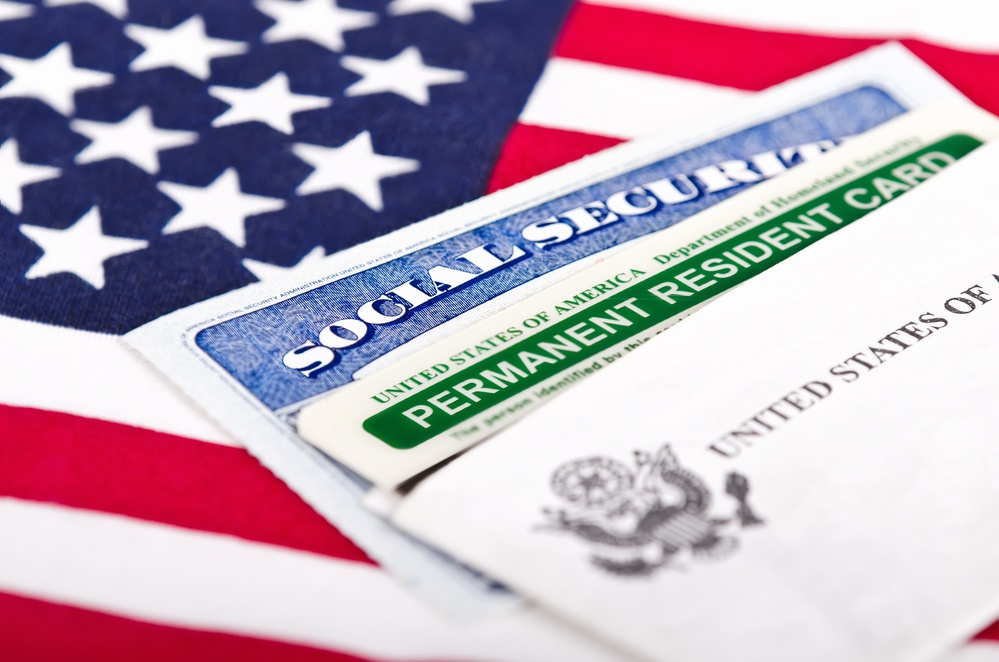U.S. IMMIGRATION LAW

The Green Card provides official, permanent immigration status to immigrants for the U.S and eventually U.S. citizenship. It opens the doors to many opportunities in the world’s most popular country for immigration. You can live, work and study in the U.S. on a long term basis with the Green Card, and it is the first step towards a permanent citizenship status. The U.S. offers permanent visas through employment, investment, special immigrant status (religious workers), and families.
We are knowledgeable, capable and experienced in this area. Allow our law firm to help you navigate through the details of the Permanent Immigration Visa process to ensure that you meet the necessary requirements the first time you apply.
VISA CATEGORIES
The PERM labor certification confirms that the United States Citizenship and Immigration Services (“USCIS”) has made a determination that there are no able, willing, available and qualified U.S. citizens or permanent residents available to do the job offered. The certification requires that the sponsoring employer conduct recruitment, such as advertising the position for a minimum of 30 days, offer a prevailing wage that is determined by the U.S. Department of Labor, and review resumes based on the minimum requirements for the position. Once the PERM application is approved by the Department of Labor, the employer may file the I-140 Immigrant Visa Petitions. Obtaining a Green Card through PERM may take several years for approval.
Please note that physical therapists and registered nurses are not required to have an individual labor certification because these occupations are known as “Schedule A” occupations. There are a number of exclusions to the PERM Labor Certification, including exclusions for aliens with exceptional science and performing arts abilities. Our law firm can help you carefully review and understand the requirements and exclusions that may apply to your specific situation.
Do you have additional questions? If so, click the button below.
Priority workers are those who have demonstrated extraordinary ability in the area of art, science, education, athletics or business. The benefit of being a beneficiary of an EB-1 classification is that a PERM Labor Certification and /or job offer is not required. The foreign worker has the ability to self-petition and prepare the I-140 application without an employer. While an employment offer is not required in the visa application process, the candidate must meet certain criteria. The criteria vary per occupation. Therefore, you truly need a legal advisor to assist you with understanding what is required under the following occupations:
- EB-1A – Persons of Extraordinary Ability – among other requirements, this worker must demonstrate at least 3 of 10 criteria as evidence of a one-time achievement.
- EB-1B Outstanding Professors and Researchers – among other requirements, this worker must demonstrate at least 2 out of 10 criteria and have an offer of employment from a U.S. employer.
- EB-1C Multinational Managers or Executives – among other requirements, this worker’s foreign company must have been in business for at least 1 year as the same corporation or affiliate corporation before making a petition. Under the EB-1C visa category, foreign entities must already have L-1A status for 2 years before they can apply for a Green Card, and the entities overseas business and U.S.-based business must be actively doing business.
Do you have additional questions? If so, click the button below.
An alien of exceptional ability or with an advanced degree (or its foreign equivalent) can apply for the EB-2 visa. EB-2 visas are categorized into the following three methods:
- EB-2A – Advanced Degree – this subcategory requires that the job you apply for require an advanced degree as a prerequisite to employment. In addition, you must be able to show proof of 5 years of post-baccalaureate work experience.
- EB-2B – Exceptional Ability – this subcategory requires that you demonstrate an ability of exceptional ability in the areas of art, science or business.
- EB-2C – National Interest Waiver – under this subcategory, aliens are requesting that the Labor Certification be waived. This category may seem ambiguous to a certain degree because the applicable statute does not define the jobs that qualify for national interest waiver. However, waivers are typically granted to those who are able to show exceptional abilities in their field of specialty that could benefit the U.S.
Under either of these subcategories, the USCIS will require that you meet certain criteria and be able to produce specific documentation that supports the issuance of a EB-2 visa. This is where you especially need the careful eye of a qualified immigration attorney to assist. We would be happy to craft a visa pathway plan that is ideal for your long term stay in the U.S.
Do you have additional questions? If so, click the button below.
The EB-3 category consists of three groups:
- EB-3A – Professionals – individuals holding a bachelor’s degree or higher.
- EB-3B – Skilled Workers – individuals capable of performing work requiring at least 2 years of education, experience or training; and
- EB-3C – Other Workers – individuals who only need 2 years of training or experience (for example, seasonal jobs).
All EB-3 cases, other than Schedule A cases, need a Labor Certification (see the PERM Labor Certification tab above) and a job offer. The “unskilled worker” category is the only category that does not require the stringent requirements of the other EB-3 categories. There is a very long backlog for this visa. Therefore, determining the right pathway is crucial for moving forward with your immigration plans.
Do you have additional questions? If so, click the button below.
The EB-4 visa is another pathway to immigration under the Green Card if your profession qualifies you as a Religious Worker or Special Immigrant. This visa category is reserved for the following immigrants:
- Religious Workers
- Physicians
- International Organization Employees
- Broadcasters
- Panama Canal Zone Employees
- Retired NATO-6 employees
- Spouses and children of Deceased NATO-6 employees
- Armed Forces Members
- Iraqi/Afghan Translators
- Iraqis who have assisted the U.S.
In recent years, the statutory authorization for issuance of the EB-4 visa to certain Special Immigrants has changed. Therefore, it is important that you seek the advice of an immigration attorney to bring you up-to-date on the latest information available for this visa.
Do you have additional questions? If so, click the button below.
If you are an investor or entrepreneur desiring to do business in the U.S., the U.S. has several investor programs that can help you gain access to the economic ventures and advantages you are seeking.
These programs include the EB-5 Immigrant Investor, L-1A/EB-1C and the E-2 Non Immigrant Investor programs. There are several differences between these programs. Please click here to learn more about the U.S.’s Investor Visa Programs.
Do you have additional questions? If so, click the button below.
Certain foreign nationals (i.e. naturalized citizens) who are family members of U.S. citizens and lawful permanent residents can become permanent residents of the U.S. based on their family relationship. These foreign nationals may be eligible for the following family-based Green Cards:
(1) Unlimited Family-Based Green Cards: Under this family-based visa category, these immigrants may include:
- A spouse, widow(er), unmarried children under age 21 of a U.S. citizen, and a parent of a U.S. citizen who is age 21 or older.
- Returning residents (“SB”).
- Immigrants who lived in the U.S. previously as lawful permanent residents and are returning to live in the U.S. after a temporary visit of more than one year abroad.
(2) Limited Family-Based Green Cards: In order to bring your loved one to the U.S. under this particular Green Card, this family member must qualify for one of the following categories:
- Family First Preference (F1) – unmarried sons and daughters of U.S. citizens (and their children if they have any).
- Family Second Preference (F2) – spouses, minor children, and unmarried sons and daughters who are over age 20 and who are permanent residents.
- Family Third Preference (F3) – married sons and daughters of U.S. citizens, and their husband or wife and children.
- Family Fourth Preference (F4) – brothers and sisters of U.S. citizens who are over age 20, and their husband or wife and children.
(3) K-1 Fiancé Visa and Marriage: Unlike other permanent visas, the K-1 Fiancé Visa is a temporary visa that is granted for the sole purpose of getting married in the U.S. Accordingly, this visa allows the engaged partner of a U.S. citizen to enter the U.S. and requires that the couple marry within 90 days after arrival. After the marriage, the foreign spouse can then apply for a Green Card.
Do you have additional questions? If so, click the button below.
IMMIGRATION STATUSES
Are You Eligible to Immigrate to the United States?
Email us with your Questions
ASK AN IMMIGRATION ATTORNEY
Do not leave crucial decisions to chance. Allow an experienced Immigration Lawyer to skillfully guide you through the immigration process. If you have questions, we want to hear from you and answer your questions. Please submit your question below, and one of our legal professionals will respond to you soon.



